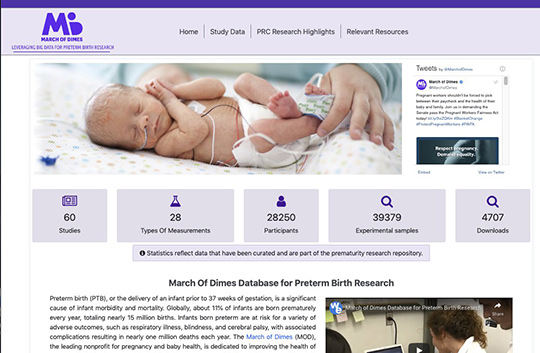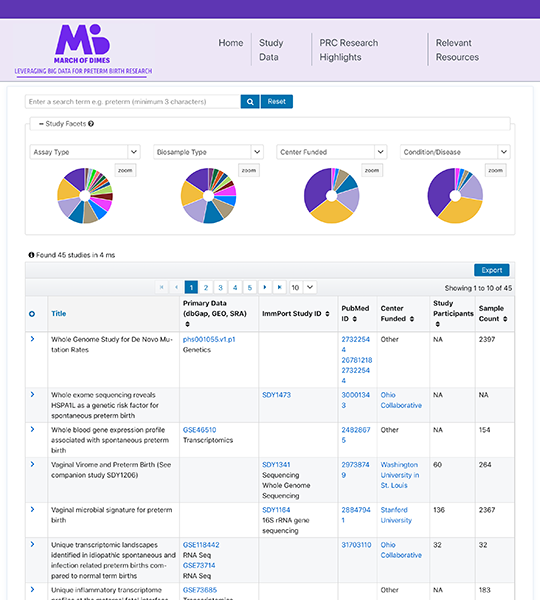Introducing the enhanced March of Dimes database for preterm birth research
Marina Sirota helps establish a new and improved database for preterm birth research as part of the March of Dimes Prematurity Research Network.

The March of Dimes Database for Preterm Birth Research was originally conceived and developed by Marina Sirota, Ph.D. and Atul Butte, MD, Ph.D. from the Bakar Computational Health Sciences Institute at UCSF as part of the March of Dimes Prematurity Research Center (PRC) at Stanford. Its aim was to organize scientific data and research across all March of Dimes-funded PRCs with the goal of enhancing research collaboration and coordination to accelerate the overall pace of discovery.

Dr. Marina Sirota
Today, Dr. Marina Sirota, Dr. Tomiko Oskotsky, and team have established a new and improved database for preterm birth research as part of the March of Dimes Prematurity Research Network, pretermbirthdb.org. The database serves as a centralized hub of organized scientific and clinical research data across the March of Dimes-funded PRCs, as well as relevant publicly available data. The data in the repository are diverse and includes genomic, transcriptomic, immunological and microbiome data. In addition, we are augmenting relevant datasets from participating laboratories with public and government databases and private data sources.
The database is an invaluably effective tool in the fight to understand and prevent preterm birth, one of human health’s most complex and intractable problems. Preterm birth, or the delivery of an infant prior to 37 weeks of gestation, is a significant cause of infant morbidity and mortality. Globally, about 11% of infants are born prematurely every year, totaling nearly 15 million births. Infants born preterm are at risk for a variety of adverse outcomes, such as respiratory illness, blindness, and cerebral palsy, with associated complications resulting in nearly one million deaths each year.

Dr. Tomiko Oskotsky
Integral to the database work is a collaboration with Northrop Grumman’s Health Protection Solutions Team, a partner of the National Institute of Allergy and Infectious Diseases, Division of Allergy, Immunology, and Transplantation at the National Institutes of Health (NIH). The team from Northrop Grumman helped to create the original database on ImmPort as well as develop the new and improved version of the database. “The Northrop Grumman team has done such brilliant work to revitalize this database, making it much more robust and easier to use. This will undoubtedly facilitate advances in preterm birth research,” says Dr. Oskotsky.

Along with a new user-friendly interface, the updated database has references from 31 studies, and includes genomic, transcriptomic, immunological and microbiome data that is available to the scientific community at large. This new version also builds off the original ImmPort site established in 2015, and now boasts over 20,000 experimental samples, from over 9,000 participants, within 14 types of measurements to explore. Users are able to search by assay type, biosample type, condition/disease represented, and/or by contributor. The Research Highlights section provides easy access to both pre-prints and peer-reviewed manuscripts published by the PRC investigators.
We are already seeing the benefit of this compilation of data through Dr. Sirota’s own efforts in integrative multi-omics analysis with the goals of improving the diagnostic and therapeutic strategies for preterm birth. The repository is also enhancing cross-institution and discipline collaboration to find unique solutions to address the challenges of preterm birth and engaging the computational community with crowd sourcing events such as the DREAM challenges. In particular, earlier this year, a transcriptomics DREAM challenge with the goal of predicting which women are at a higher risk of preterm birth attracted more than 500 participants from all over the world. Participants were asked to blindly predict the risk of preterm birth. (preprint of the work: https://www.biorxiv.org/content/10.1101/2020.06.05.130971v1.full.pdf).

Dr. Gaia Andreoletti
Dr. Gaia Andreoletti, the postdoctoral researcher at the Sirota lab leading the DREAM effort, explains “The DREAM Challenges engage the scientific community to collaboratively solve fundamental biomedical questions. The DREAM crowdsourcing platform enabled the engagement of individuals from diverse areas of expertise around the world on our preterm birth challenge and provided valuable insights into ways that data could successfully be analyzed”
“These data-sharing efforts combined with powerful bioinformatics tools provide an unprecedented opportunity to apply precision medicine strategies to preterm birth research. It is our hope that this work will lead to discovery of novel diagnostic biomarkers and ultimately facilitate more effective interventional strategies to help manage and prevent preterm birth.” says Dr. Sirota
About March of Dimes
March of Dimes (MOD), is the leading nonprofit fighting for the health of all moms and babies. For more than 80 years, March of Dimes has empowered families with programs, information and tools to have healthy pregnancies. Today we’re building on that legacy to level the playing field for all moms and babies, no matter their age, socio-economic background or demographics. We support moms throughout their pregnancy, even when things do not go according to plan. We advocate for policies that prioritize the health of moms and babies and pioneer research to find solutions to the biggest health threats they face.
Learn more at marchofdimes.org.